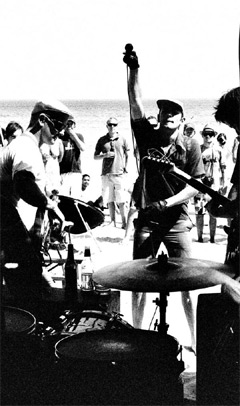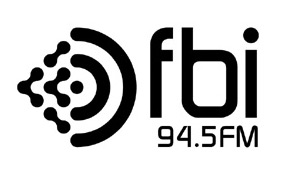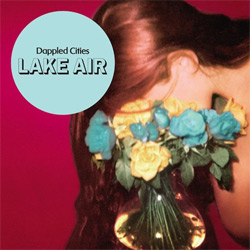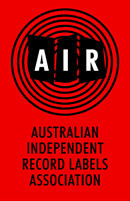 This is my first interview on behalf of One Movement Word, which is the official blog of the One Movement For Music (OMFM) Perth festival and conference. In the lead-up to the October 2009 event, I’ll be speaking with a range of OMFM artists, speakers and music industry figures, and publishing the full transcripts on here.
This is my first interview on behalf of One Movement Word, which is the official blog of the One Movement For Music (OMFM) Perth festival and conference. In the lead-up to the October 2009 event, I’ll be speaking with a range of OMFM artists, speakers and music industry figures, and publishing the full transcripts on here.
Stu Watters is General Manager of the Australian Independent Record Labels Association (AIR). After representing AIR for five years, he recently announced his depature from the organisation. I caught up with Stu before he heads to Brisbane to launch a new video production and licensing venture in July 2009. I came across former FasterLouder editor Cec Busby’s 2007 interview while researching, and used one of Stu’s responses during that conversation for my first question.
Music fan to music fan: how have your listening habits changed since you first saw Dire Straits as a young tacker?
It’d have been hard for me to avoid Dire Straits at that age, given that there were only a few outlets and media opportunities available to artists. And those guys just had access to all of it, and there was no escaping it.
These days, it’s a very different ballgame: obviously at that age, I was very open to listening, and becoming a fan of whatever was put in front of me, whereas these days I’ve certainly developed a different palate. But I also explore and discover music in all the ways that are available to me. I have to say that there’s a lot of music that I fall in and out of love with very quickly, because something else comes along, which didn’t happen as much when I was younger.
I would say that it’s harder to hold on to some of the music in the same way that I’d used to, in that I’d just flog stuff to death. My wife would argue that I still do, but I don’t reckon I do it anywhere near the same extent that I used to, because I’ve just got so many options that I’m exposed to on a regular basis. (The Twitter tool) Blip.FM has ruined my life this week, because all of a sudden I’ve got a whole bunch of new music that I have to listen to!
It’s so much easier these days to get exposed to a lot more music. It’s very important to define filters that you can trust – people who you can look to, and like what they’re listening to – and that’s why I like software that can ‘plug and stream’. It’s a shame that (online radio streaming app) Pandora isn’t accessible here (in Australia) any more, because that was a really fantastic service. I could punch in something that I really liked, and it would give me stuff that I’d never heard of, but I knew that I’d like it.
You know better than anyone in the industry that acts can come and go. I find that due to the sheer volume of music available online, it’s difficult for artists to get noticed – to be heard above the crowd, so to speak. If you were starting a band today, how would you go about getting heard?
 As a band who wants to get exposure, you’re going to have to focus on the core outlets, which I think are still very much around community and commercial radio. I don’t think that that’s going to change for a long time. There’s certainly a greater opportunity for artists to create videos without focusing on the goal of television exposure, although that may happen naturally. Having a strategy built around covering online bases such as MySpace and YouTube is important, but I think it’s still absolutely critical that you have a very, very strong live performance that creates an amazing audience.
As a band who wants to get exposure, you’re going to have to focus on the core outlets, which I think are still very much around community and commercial radio. I don’t think that that’s going to change for a long time. There’s certainly a greater opportunity for artists to create videos without focusing on the goal of television exposure, although that may happen naturally. Having a strategy built around covering online bases such as MySpace and YouTube is important, but I think it’s still absolutely critical that you have a very, very strong live performance that creates an amazing audience.
Bands like Eddy Current Suppression Ring are testament to that idea: it’s a show that you go to, and you take it away with you when you leave. They sell phenomenal amounts of records (at each show), and they’ve done fuck-all in terms of production. I was lucky enough to go to the Melbourne Zoo show that they did recently, where 3,500 people turned up, purely because they wanted to see this band put on a great live show. And I still think that’s absolutely critical, irrespective of any of the changes that’ve occurred to the environment in which we distribute music.
That live experience, that tangible, tactile thing, is still critical to the whole experience.
AIR works with a variety of digital music services and distributors. There’s quite a few on the market – iTunes, Tunecore, and CDBaby, for example. Which of these offer among the best return on investment?
You’ve got to identify what each one is trying to achieve. iTunes and Bigpond are retailers: Tunecore, IODA, The Orchard and so forth are all aggregators and distributors, and then you’ve got the relationship directly with the physical distributors. I think the dynamics have changed dramatically, and it would certainly appear that for a number of services – digital aggregator models which have been running off of percentages – the dynamic has changed in a huge way, in that they played a ‘gatekeeper’ role for a number of years, and I think that’s been broken down a lot.
The Tunecore model, where they’re working off of the upfront, ‘flat fee’, is changing the dynamic considerably. And when you’ve got owners of content in the market who’ve licensed the content through a third party to a licensee, they’ve gone into those agreements at a time when there wasn’t a solution. It’s now very simple for the owners of the content – the licensors – to go directly to the licensees and offer the product. In the past, a digital delivery platform didn’t exist to enable that relationship; now, it’s very easy.
In terms of value for money, there’s been a number of middle-men that’ve been cut out of the picture. At the bigger end of town – and by that, I mean even the big indie labels who’re still small players on a larger scale – they’re now able to be in a position where they can supply the content to the consumer directly.
I don’t believe there’s a particular service that’s the ‘best’ value for money; the best value is the direct relationship between those two business entities. In terms of small, independent artists, services like Tunecore which offer ‘flat fee’-based pricing are probably turning out to be a better deal for a lot of companies that don’t have the leverage that others do.
You mentioned that middle-men have been cut out of the industry. Do you think that’s for the better?
Certainly. If you’re an artist and you’re dealing with a record label, there’s a percentage of your overall revenue that you’re losing there. If that record label is dealing with a distributor, then there’s another percentage. If that distributor doesn’t have a relationship with an online retailer, such as iTunes, Bigpond or Amazon MP3, they’ll have to use an aggregator, so there’s another percentage that the artist isn’t seeing. It’s just like continually slicing an ever-diminishing pie. The less steps there are in that equation to reach the consumer, the better off the artist will be financially. The end goal of most artists is to reach as many people as you can with your music; it’s not necessarily about making money, but reaching an audience has always been important.

Do you believe radio airplay is still important for emerging acts in Australia?
Absolutely. Let me give you an example – The Middle East. A colleague of mine heard them on Triple R, a community radio station, before they were played anywhere else.
Through that, we found the band, and Triple J discovered them soon after. Their music’s awesome, and the radio airplay has created a following for them.
I’m a massive supporter of community radio in this country, and it’s not until you visit other countries that you realise that they don’t have public radio in the same way that we have with Triple J – although, the UK has six BBC stations. We have a really strong radio culture in Australia, and I think it plays an extremely important role. And you can’t deny the impact that commercial radio airplay has on breaking artists. I don’t think it’s the ‘be all and end all’, but certainly, if an artist gets to the level where they can create enough momentum on commercial radio, there are usually excellent dividends to be paid as a result.
It’s interesting that you mentioned The Middle East, because their release (‘The Recordings Of The Middle East’ EP) is my favourite of 2009. It’s amazing.
Yeah, it’s killing me. I have a lot of faith in their artistic ability, to become an international act. It’s one of those records that my wife has hidden from me. I’m not allowed to play it any more! That’s a classic example of listeners having the opportunity to discover a band from Townsville, because of the shortened distance between audiences. A band like that 20 years ago, out of Townsville; it’d have taken a hell of a long time before they got to that level of exposure.
And there’s a danger in that, too: artists who are making really good music, but who are perhaps not quite ready for the impact of their work. And I know that those guys (The Middle East) are getting smashed on every front. Who’s managing them? Who’s doing all the booking? They released the EP through Spunk, but who knows what’ll happen next?
They’re getting belted as an act, and you wonder whether they’re professionally equipped to deal with it. There’s a real upside to the diminishing barriers to access with this stuff, but there can also be an impact that’s not always positive. I don’t think it’ll be negative in this case, but it’s not always positive in terms of – is the band ready for that level of attention? And if they aren’t what are the consequences of them not capitalising?
For bands looking for radio airplay, do you think it’s best to start at a community radio level and move up to Triple J, or just shoot for the top?
 It depends on the content. There’s no ‘one shoe fits all’. Community radio is the most diverse, and offers the most opportunities in terms of exposure. Triple J is more responsive to community radio than ever before – and this is just my view, which Triple J might counter – but I think that the rise of FBI, and online blogging and podcasting communities, have really impacted on what Triple J discovers and starts playing. FBI has made a huge impact in Sydney, given that most of the Triple J team is based in the same city. I’ve seen more of the ‘better’ music generate a profile out of community radio before it’s generating a profile anywhere else.
It depends on the content. There’s no ‘one shoe fits all’. Community radio is the most diverse, and offers the most opportunities in terms of exposure. Triple J is more responsive to community radio than ever before – and this is just my view, which Triple J might counter – but I think that the rise of FBI, and online blogging and podcasting communities, have really impacted on what Triple J discovers and starts playing. FBI has made a huge impact in Sydney, given that most of the Triple J team is based in the same city. I’ve seen more of the ‘better’ music generate a profile out of community radio before it’s generating a profile anywhere else.
So I support the notion that you should service community radio at all costs, and that you should also service, where appropriate, the public radio stations as well, whether it’s Triple J, ABC National, ABC Regional or commercial stations. It just depends on the content, but I think that community radio has the broadest appeal for the majority of Australian content.
I’ve spoken to artists who feel that being signed to a label is less necessary than ever before, as determined artists can handle their own management, promotion and distribution through the web. What are your thoughts on artists who don’t particularly want to sign to labels?
That’s fine, if they’re prepared to do all of that. I think that there’s still a place for business relationships to occur between artists and other entities, whether they’re labels, or distributors, or publicists. There certainly needs to be a central point where the act’s affairs are managed, whether that’s done by a manager or in-house. It’s entirely possibly; it’s more possible than it has been before, but I don’t think that’s necessarily an argument for redundancy, to be honest. There are more options available, but there are cases where it just makes sense for people to enter into those relationships.
I think if it’s all handled in-house, it’s a matter of balancing self-management and writing music. I mean, if The Middle East are getting tied up in all their own affairs and they’re not writing any new music, then it’s to the detriment to the quality of their act.
Exactly. But having seen them just the other week, and after hearing a whole bunch of new material, it warmed my cockles to know that they were doing something other than just the five tracks on the EP.
How does AIR help indie artists who aren’t signed to indie labels, and who don’t intend to?
About 25-30% of our indies are unsigned artists. We have a whole range of opportunities for those guys, particularly if they want to remain unsigned artists. Through the D-Star MPE program, generally you can’t open an account with those guys unless you’re turning over [a significant] amount of money. So there’s opportunities for acts to deliver their product to a whole range of media, including commercial radio, blogs, public and community radio. We also help out by giving AIR members access to our professional network. They can call us up and ask questions directly. I’ve fielded three calls today from artists who have business questions that they need answered.
We have a bunch of members-only stuff in the back end of the website, which is probably more relevant to self-releasing independent artists, or small-to-medium independent labels. It’s a very open environment in the independent sector, and for an independent artist to be able to get onto the phone to an owner of a record label and get advice from them, that’s certainly an open part of AIR’s network.
A change of topic. This is something I’ve been thinking about a lot, as I’m in the middle of writing a series of columns for The Music Network on this topic. Why do you think that the industry continues to push artists toward releasing albums?
 I’m not sure if it’s the industry that’s pushing artists to releasing albums, or whether it’s more the artists holding on to the idea. Certainly, if you take Radiohead as a case in point, the album was very much a part of their philosophy. The ‘In Rainbows‘ release had very little to do with the consumer. I don’t think it’s the labels continuing the album trend, per se; holistically, it’s the industry that’s focussed on albums, including the artists. They generally want to do a body of work. It’s kind of like a visual artist: they don’t just exhibit one piece at a time, they’ll showcase a collection of pieces that they’ve been working on over a period of time. The idea of the album appeals to the artist, and it appeals to the consumer.
I’m not sure if it’s the industry that’s pushing artists to releasing albums, or whether it’s more the artists holding on to the idea. Certainly, if you take Radiohead as a case in point, the album was very much a part of their philosophy. The ‘In Rainbows‘ release had very little to do with the consumer. I don’t think it’s the labels continuing the album trend, per se; holistically, it’s the industry that’s focussed on albums, including the artists. They generally want to do a body of work. It’s kind of like a visual artist: they don’t just exhibit one piece at a time, they’ll showcase a collection of pieces that they’ve been working on over a period of time. The idea of the album appeals to the artist, and it appeals to the consumer.
I think for our sector, at an industry level, there’s now very much a single-track culture. It’s been reinvigorated with digital distribution. I don’t necessarily buy the argument that it’s the labels who’re keeping the album alive, I’d say that the artists are equally, if not more, influential in the idea of the album. But I like the idea that artists like Nine Inch Nails [pictured right] and Iron & Wine are repositioning their thinking around their music releases. This idea of “release an album every three years” has largely gone, and I think that acts are paying more attention directly to their fanbase. There’s a real necessity these days to ‘plug in’ to your audience on a regular basis, to keep the fans happy. Offer them something free, and unique.
I read about AIR’s partnership with JB Seed for the ‘Independent Times‘ panel discussion at the One Movement For Music conference. The plan to sponsor ten previous JB Seed management workshop attendees is interesting. How do you think the role of the artist manager has changed during your time in the industry?
I think there’s a distinct lack of manager development in Australia. That requires addressing, and I think that The JB Seed program has gone a long way to doing so, particularly for self-managed artists, as John Butler was in the past. He managed himself for a number of years, and worked it out himself; he now has a management partner relationship with (Jarrah Records owner) Phil Stevens, who is his manager, for all intents and purposes. I think there’s now a much greater incidence of artists working with their managers, than artists being led by the managers. I think that’s an important distinction to make, and that’s changed relatively recently.
Managers also need to be across a lot more aspects of the industry. There are many managers these days who’re also – by virtue of their role – required to manage the recording, and virtually embody the manager of the artists’ record label, in many ways.

I just want to clarify that AIR’s partnership with One Movement and The JB Seed. We’re supporting what The JB Seed are doing, but they’re the guys who’re sponsoring those ten managers to come in for the discussion. AIR are actually developing the ‘Independent Times’ program, which is where the managers will plug into. I just wanted to be clear that One Movement and JB Seed are the entities who’re sponsoring that initiative, not AIR! We work very closely with The JB Seed. We’ve worked with every management workshop that they’ve done, in terms of content and delivery. AIR’s relationship with One Movement is purely with delivering the ‘Independent Times’ program for that conference.
You’ve been involved with a lot of music conferences over your time, with both (Brisbane-based music industry development association) QMusic and AIR. How do you feel that One Movement is shaping up?
It’s really interesting. They’ve stated a strong focus for the conference and festival; their approach is probably the only music industry conference in Australia that revolves around a festival, in that the One Movement Festival is a two-day event. And I think that carries with it an immense degree of weight, particularly when you look at the partners of (Sunset Events founder, David) Chitty and (concert promoter, Michael) Chugg. Their influence adds a whole different dimension to the conference dynamic. People like the idea of going to Perth for a big conference – because it’s a fucking long way to go, you better have a really good reason to go there!
For sure. I’m excited about the conference, but I’m more excited about making One Movement Word into a damn good festival blog. Interviews like this will greatly assist toward that end. Thanks for your time, Stu!
Stu Watters is leaving AIR in July 2009 to pursue a new video production and licensing venture in Brisbane called Morph TV Productions. Catch him on Twitter or via email.
One Tuesday afternoon in April, the Attorney-General of Australia, Mark Dreyfus, was sitting on a Qantas flight bound for Brisbane. While the aircraft taxiied to the runway, Dreyfus used his smartphone to check and reply to emails. His posture was a familiar sight of the modern era: head down, hands low, eyes trained on a rectangular cluster of LEDs, while fingers and thumbs silently fondled a touchscreen.
 Four albums into a career that blossomed with the release of second LP Granddance in 2006, Sydney quintet Dappled Cities here present their most accomplished collection. Granddance brought the band into the national consciousness via a string of outstanding singles; Lake Air is a complete work, one so good it deserves to take Dappled Cities much further.
Four albums into a career that blossomed with the release of second LP Granddance in 2006, Sydney quintet Dappled Cities here present their most accomplished collection. Granddance brought the band into the national consciousness via a string of outstanding singles; Lake Air is a complete work, one so good it deserves to take Dappled Cities much further.
 This is my first interview on behalf of
This is my first interview on behalf of 


 I’m not sure if it’s the industry that’s pushing artists to releasing albums, or whether it’s more the artists holding on to the idea. Certainly, if you take
I’m not sure if it’s the industry that’s pushing artists to releasing albums, or whether it’s more the artists holding on to the idea. Certainly, if you take 